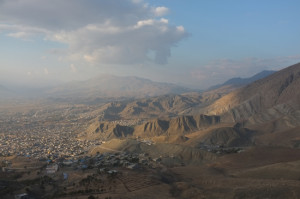Graham Mort’s Soran blog posts: 8 Nov 9 Nov 10 Nov 11 Nov 12 Nov 13 Nov 14 Nov 15 Nov
 I’m woken by bright sunshine as well as the sound of traffic. The skies have cleared and the temperature has begun to rise after three overcast days. Today is my presentation to the English department at Soran about Lancaster, the Centre for Transcultural Writing, and what we hope to achieve through the new project here.
I’m woken by bright sunshine as well as the sound of traffic. The skies have cleared and the temperature has begun to rise after three overcast days. Today is my presentation to the English department at Soran about Lancaster, the Centre for Transcultural Writing, and what we hope to achieve through the new project here.
First, we meet the Dean of the Faculty of Arts, Dr. Qais Kakl. His English if good, but halting as we sip glasses of tea poured over a layer of sugar. We talk briefly about the project and he promises to pick us up later from a trip to the mountains. I join Muli’s creative writing class and run some exercises with the students. It’s great fun and I focus some of the writing on my shoulder bag to explain how a metaphor can work. After the sessions the students queue up to have their photographs taken with me, which is a little embarrassing. Their enthusiasm to appear on Facebook with me is touching and alarming!
At twelve thirty I present to about 40 students and staff, linking the rise of Lancaster as a new-wave university to their efforts to develop at Soran. I outline the aims of our pilot project and field some questions – most of which revolve around our focus on women. So far, so good. In the afternoon we visit the English teaching centre, the Handren cultural centre, and a staff residence, D2, with spectacular views of the mountain. We arrive back at the hotel with a carrier bag of oranges and Quais arrives shortly afterwards to pick us up.
Qais drives us out of Soran to Rawanduz, the ancient regional capital. It sits under a ridge of mountains surrounded on three sides by a vast gorge, making it almost impregnable before the days of missiles, drones and fighter aircraft. Through the town of Rawanduz is Pank – a mountain top holiday resort complete with hotel, chalets, Ferris wheel and helipad. At the hotel restaurant we eat olives with humus and talk. I’m impressed the determination to build a new university here. The current one is located in an old barracks set up by Saddam’s regime. It’s unfit for purpose now due to pressure of students, but a new temporary campus is under construction and will lead to a permanent campus with digital facilities and fast Internet connectivity. The first move will happen in about two months and teachers, too, will be relocated.
Qais is a linguist and passionate about the need for strong Kurdish and English Departments at Soran. Improving the quality of teachers will improve the quality of students, which he acknowledges is a problem. Links with UK and US universities to accredit courses and establish standards are needed as benchmarks in themselves, but also to connect Soran to a wider world that can begin to understand their efforts here. English is now being taught more widely in schools, so in ten years time the situation here could be markedly improved. The restaurant behind us has filled up with soldiers in desert camouflage fatigues. As dusk falls, the city lights up in the distance and the tips of the mountains turn apricot then pink in the sunset. I promise to take his message back to Lancaster.


